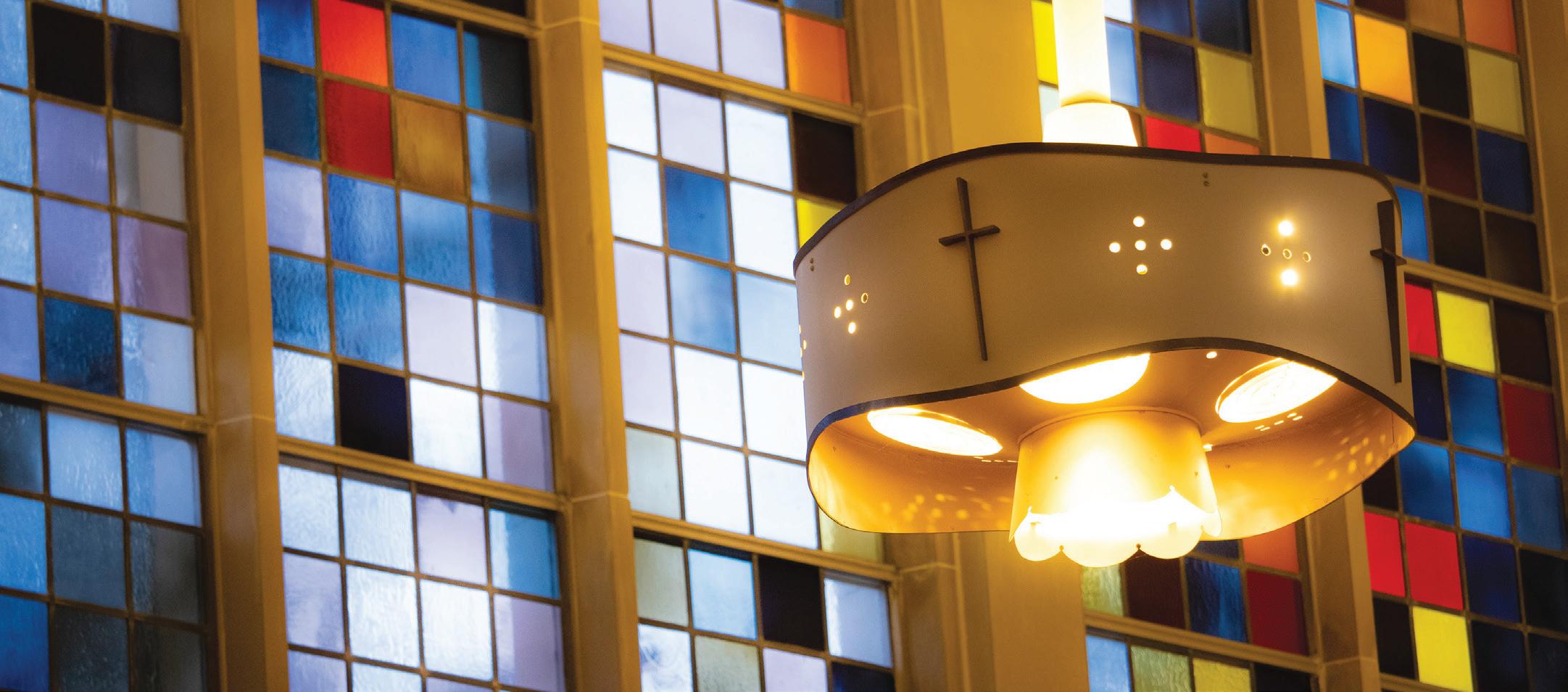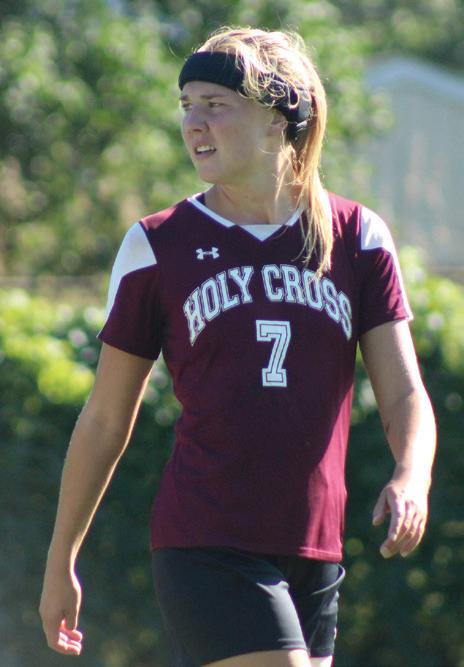
18 minute read
Career Development
Preparing Scholars for the Future Adam DeBeck
by Madelyn McBride, Gateway 7.0
As I walk into Adam DeBeck’s office, I expect the normal interview process – ask the questions, type some answers, and then get writing; however, this time, the process differed. Before I had the chance to begin, DeBeck interjected and asked if we could move to a new location for the interview, away from his desk that was piled high with a looming workload. We took a moment to discuss our favorite places on Holy Cross campus and decided to venture to the second floor Vincent Atrium, one of his peaceful places on campus with 360-degree windows that displayed the falling snow outside. Once we were situated, he naturally started inquiring about myself and my background. Through this, a feeling of comfort and familiarity engulfed our interview. For a moment, I forgot that I was there for a Connections interview; instead, we were just there to talk. Later in the interview DeBeck mentioned, “I don’t want the Career Center to be transactional; I want it to be conversational.” At that moment, I realized the importance of our initial conversation and the power that Adam DeBeck and the Holy Cross Career Center offers students: personal connections that lead to tailored internship opportunities and careers.
DeBeck has always had a gift when it comes to interacting with new people and sharing relatable stories. During his time in college as a firstgeneration student, he studied Human Resources; however, after graduation, he was unsure of the direction that this would take him. Upon graduation, DeBeck had compiled a thorough resume with rich experiences and academics, yet he struggled to grasp the skills that he could offer companies. Taking time to reflect on his passions during college, he realized how much he enjoyed being a tour guide and ambassador for his own small, private, Catholic college. Translating this passion of sharing stories to his career, DeBeck obtained a job at Holy Cross as an admissions representative for students coming to Holy Cross from across the country; traveling to different schools and events, DeBeck endeavored to attract highperforming students to South Bend.
As time continued and his own family grew, DeBeck let go of the constant travel to assume a role in the Office of College Relations that involved communicating with alumni and bringing them back to campus. This opportunity allowed him to start meeting alumni, creating meaningful connections, and learning about the different paths of Holy Cross graduates.



– Adam DeBeck, Office of Career Development & Capstone Instructor
He greatly valued his relationships with Holy Cross alumni, yet DeBeck missed interacting directly with current students. Fortunately, this void was filled when he was asked to take over the College’s senior Capstone class. A course that all students must participate in before graduation, the Capstone class offers seniors a time to reflect on their experiences, skills, and beliefs through creating a twenty-five-minute presentation about themselves. While each student might not have a job upon graduation, DeBeck wanted his students to see the value that they could add to their desired job field – something that he struggled with early on in his career.
Now that DeBeck wore two hats, working in the Office of College Relations and teaching the Capstone class, Father David T. Tyson, C.S.C. envisioned a way to merge DeBeck’s skills and fully use his unique ability to connect and inspire students and alumni. Father Tyson asked if DeBeck would assume the role of Director of Career Development alongside the College’s Internship Coordinator, Kathryn Cressy.
DeBeck dove headfirst into his new role, working hard to create a demand, desire, and interest in hiring Holy Cross students in the South Bend community. To start, he took advantage of the small size of Holy Cross and began getting to know the students. This way, he could work towards personalized recommendations or placement for them. He hopes that students will come visit the Career Development team because they want to chat, grow, and reflect. For instance, whenever a student goes to the office looking for letter of recommendation, DeBeck places the resumes and personal statements aside and pulls out a blank sheet of paper and pen. Next, he starts questioning the students about why he/she would be a strong candidate for a job in the desired field. Rather than getting lost in titles of past involvements, DeBeck urges his students to focus on what their opportunities meant to them and the skills that they gained. “When you are writing something alone, it is drastically different from when someone is pushing you to dig deeper. When I interview students, I want them to see the value in all their experiences,” DeBeck stated. As a student discovers significant skills and their values, DeBeck jots down bullet points that will help fill in their skill gaps. DeBeck then encourages the student to use the
(continued on next page.)
(continued from previous page.)
Adam DeBeck
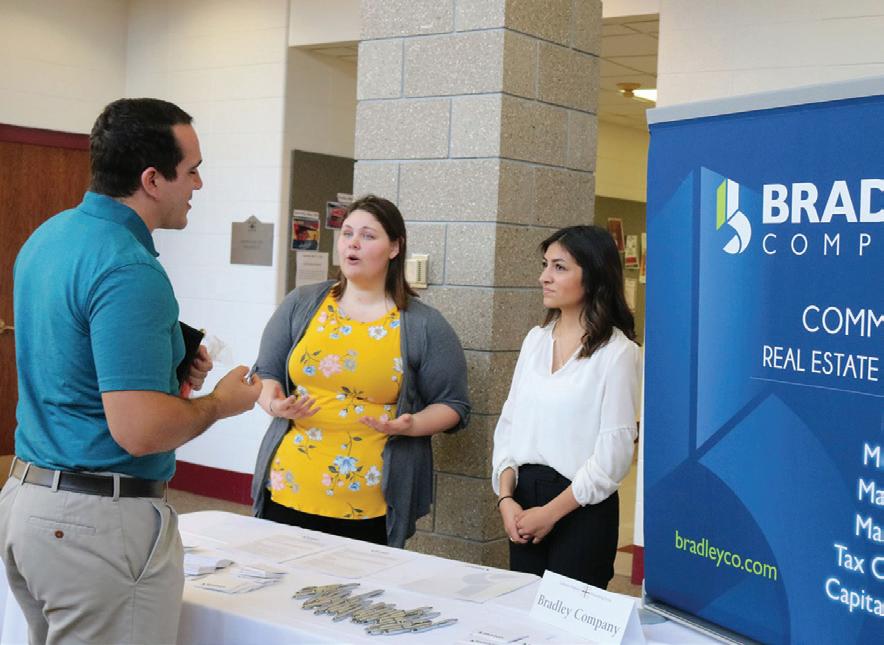
notes from their conversation to develop another draft of the document on their own. overcome their disabilities and evolve into hockey players---it solidified the fact that I want to do exactly this for the rest of my life. My goal is to help create a Blind Hockey team in every major city across the United States,” Chesrow said. He also believes that his hands-on experience gives him an advantage; hoping that other students will take full advantage of internships and soak up skills that will push them ahead.
“Knowledge is power, and by gathering as much knowledge as possible during your internship you will only set yourself up for success once your internship is over,” stated Chesrow.
Moreover, if students are struggling to obtain a job, he encourages them to reflect and find alternate ways to present themselves. “I want students to realize that all their experiences are valued, so try “fishing with different bait” by refreshing your resume to gain the employer’s attention,” DeBeck suggested. Above all, he wants his students to tap into their passions and skills to find internships and potential career paths.
Junior Anthony Chesrow achieved this through his summer experience of creating a Seattle Blind Hockey program. Playing for the USA National Blind Hockey team, Chesrow translated his personal experiences to kickstart a Blind Hockey program all the way in Seattle. By doing this, it solidified his passion and allowed him to figure out that he hopes for this to be his career.
“Hockey will forever be my true passion, but by seeing the athletes who participated in it try to Both DeBeck and Cressy are life-long residents of the local area and they strive to build bridges between the South Bend and Holy Cross community. Subsequently, they actively and regularly journey out into the South Bend community, seeking to build relationships with employers. “When I bring employers to campus, they are people I have built a relationship with over time. There is a different level of communication,” DeBeck said. With his ultimate goal to create a connected alumni network, DeBeck has an open-door policy that allows for any Holy Cross graduate to request a time to speak for fifteen minutes with his senior Capstone class about life after college.
“The network a student builds with their peers and their faculty can be extremely helpful in taking the first step after graduation. I decided to invite alumni to return to campus to show students that our alumni are another great resource anxious to support them.” Realizing that there is not just one way alumni can donate to their alma mater, DeBeck sees this as a way that graduates can give back by inspiring and informing seniors about opportunities at their respective companies. Take Tyler Kanczuzewski ‘12, who now works as the vice president of marketing and sustainability for Inovateus Solar, a company that he co-owns. Kanczuzewski works with DeBeck to connect Holy Cross students and recent graduates with paid internships. “My strong connection with HC has allowed me a continued education, continued networking, and now interns for the company I co-own. I employ Holy Cross graduates because they are experienced and motivated young professionals that can make a difference,” Kanczuzewski stated.
Holy Cross offers a different, deeper level of attention that other bigger schools cannot offer. For instance, DeBeck held the first ever career fair at Holy Cross. Compared to Notre Dame’s jam-packed, bustling event, the Holy Cross Career Fair included a few, highly curated, hand-picked employers that DeBeck closely knows. Instead of impersonal elevator pitches and shuffling business cards, the Holy Cross event consisted of in-depth conversations. Due to this personability, after the event, four companies offered Holy Cross students a position. “By knowing our students’ stories and what they are looking for and knowing individuals in our community and what they are looking for, I can pair them together,” DeBeck said.
Junior Shaima Musleh benefitted from this closer attention when Adam
DeBeck forwarded her an email about enFocus, a South Bend company dealing with industrial civic entrepreneurship. Knowing that Shaima was interested in the medical field, DeBeck shared this paid, full-time summer internship with her. While the job didn’t end up focusing heavily on medicine, Shaima expanded her skillset by working on an educational recycling program for kids and through building an app that aids at risk pregnant women. “I had so much fun during my internship because I branched out more than I expected. I realized I was good at other things than just science,” Shaima shared. This being her first job, Shaima fully utilized the Career Development Office, especially by learning how to better present herself during interviews. When asked to give a piece of advice to current students, Shaima advised others to use Holy Cross as a resource. “If you are hesitant, don’t know what’s out there, or don’t know how to present yourself, the Career Office is the place to go,” said Musleh.
Once a student is successful in finding an internship that fits their passions, Holy Cross believes that finances should not be a barrier. To combat this potential problem, Holy Cross has grant funds to financially compensate students for participating in competitive, project-based internships. Essentially, the Lilly Grant gives money to organizations who agree to employ Holy Cross students, and then the company uses the grant money as the student’s salary; this setup allows companies that couldn’t afford intern salaries to employ Holy Cross students. Last summer, Holy Cross had four official partners and eleven students placed in paid internships. Financial support from Holy Cross allowed junior Lucy Campos to participate in a competitive internship in D.C. this past summer.
“Without the grant from Holy Cross, I would not have been able to attend my program and have this opportunity,” Lucy confided. Placed with the Congressional Hispanic Institute for two months, Lucy merged two of her biggest passions – youth leadership and the Hispanic population – with politics. She had the chance to attend briefings on the hill, interact with congress people, work in the office, help with a Young Leadership program, and more. Before her internship, she hadn’t considered nonprofit as a potential career path, but this summer opened her eyes to the possibilities out there.
Lucy wants other Holy Cross students to keep their eyes and ears open for every opportunity, even if it seems unaffordable or unattainable. “Don’t be afraid to use your resources. The Career Center is honestly a great resource here. They genuinely care and have a true interest in Holy Cross students. I know the financial aspect can be incredibly overwhelming, but it doesn’t hurt to ask for help and grants,” Lucy advised. up in a room filled with individuals who you want to be one day, saying ‘hi’ to someone if you are shy, and intentionally working to grow your network. Just show up and try. I am here as a collaborator, and I want students to come to the Center because they want to be better.”
– Shaima Musleh ‘22
Above all, the Career Development Office are here for all Holy Cross students who want to expand their knowledge, experiences, and skills through participating in internships and laying the foundation for meaningful a career after graduation. In order to do so, DeBeck has some advice for students, “You have to get comfortable being uncomfortable – that means asking for help, showing

WISDOM SEAT OF
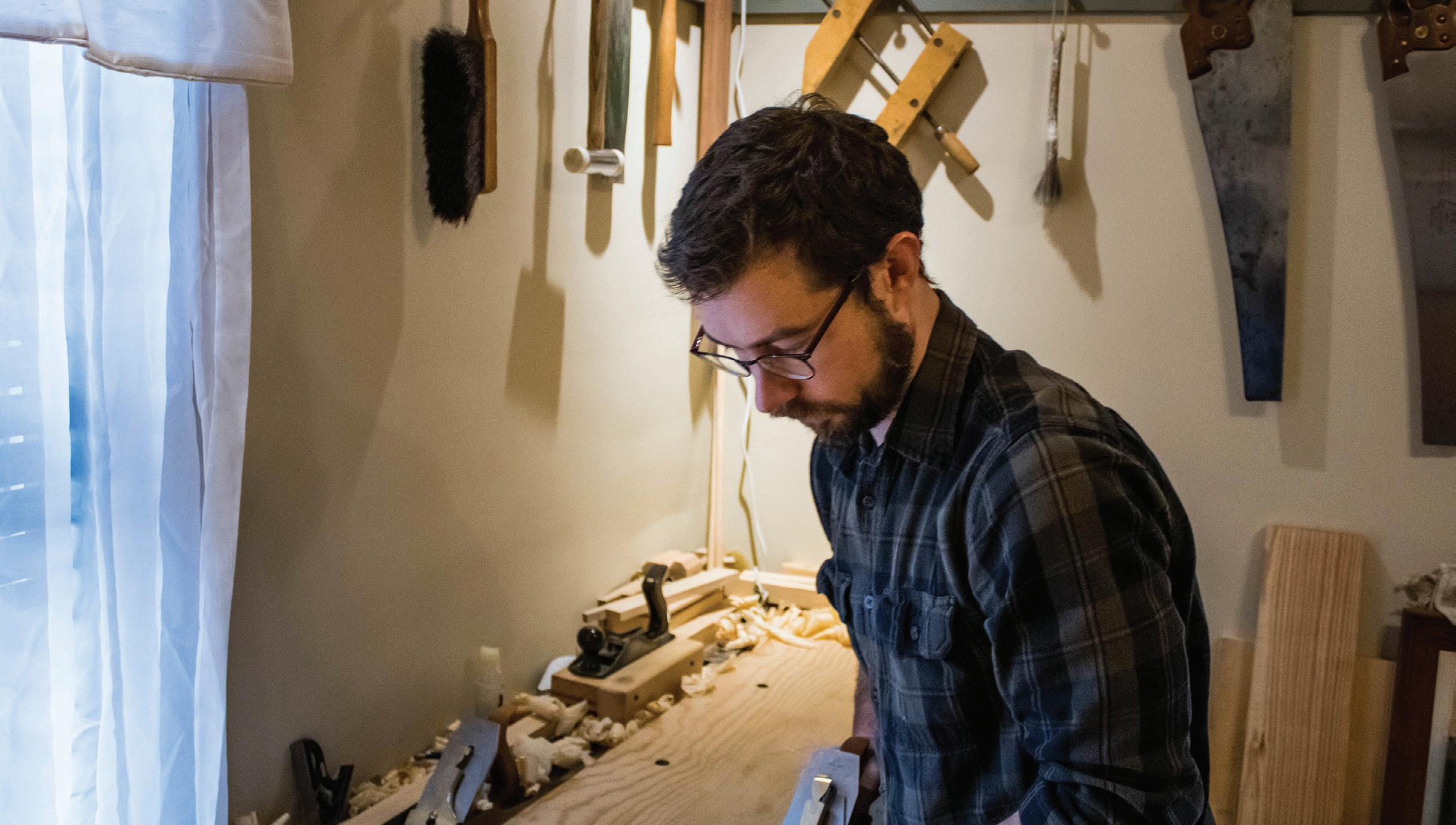
by Daniel Baker, ‘20
I made a chair. It is the first of what I hope will be many. The project was part of my career internship this fall. Since my graduation in December, I am working full-time as a pre-industrial woodworker, building furniture with hand tools.

The path that led me to this craft has been a long one--maintaining and flying on aircraft in the Navy, remodeling homes, and before volunteer work. There have been two constants through it all: a desire to work with my hands, and a love of learning.
War makes more urgent the questions of life. For me, while on deployment in the Middle East, the pressing desire to have such questions answered developed within me a thirst for wisdom and a love of books. After leaving the Navy in 2007, I moved to South Bend
to live, work, and study at the local Catholic Worker house of hospitality, a community centered on the practice of the works of mercy. I enrolled at Holy Cross College.
Three times over the past twelve years I decided to put my college education on hold for different reasons: to respond to the immediate needs of the Catholic Worker; to complete a woodworking apprenticeship under Geoffrey Keating, a friend and master of the craft; and to test a calling to the priesthood. These sojourns have been as formative as any education received in the classroom; but my studies at Holy Cross College have I believe I have found such work. This realization crystallized over time, through the crucible of wrestling with questions regarding the good life and how to realize it.
In a course of Father Michael Sullivan’s, I was introduced to Aristotle’s ethics, which is based on the pursuit of the greatest good: the happiness of the good life—and the habits of excellence, or virtues, by which one may realize the goods that constitute such a life. This Aristotelianism was synthesized with Christianity by St. Thomas Aquinas, whose thought was unpacked in the many philosophy courses I took with Dr. David Lutz’s virtue ethics course The ancients recognized the goods of virtuous workmanship: durability, function, and beauty--all “goods” grounded in the human nature of an artifact’s user, whether these traits be manifest in architecture or a chair. By the chairmaker’s fidelity to the pursuit of these goods, he enters into a relationship with his work: his virtues shape the chair; and the making of the chair shapes the worker.
This vision of work is radically at odds with much of our modern, industrial culture. Machines and management have largely separated workers from the pursuit of the good. The shift in how people generally work has
been the glue holding these experiences together as an intelligible whole: a robust liberal arts education has provided me with the tools needed to make better sense of my life, the world, and my place in it. Holy Cross has truly been to me an Alma Mater, in the image of Mary, Sedes Sapientiae, a “seat of wisdom.” I started college not knowing exactly where it would lead me; but it was always my hope that the education would prepare me for work worth doing: a job that is creative, challenging, and meaningful. In pre-industrial woodworking,

made sense; and it provided a moral framework for how I would think about work.
I learned from Aristotle and Aquinas that the key to happiness is living in accord with the natural law: a law written on our hearts, discoverable by reason, and made all the clearer by God’s gift of revelation. Living in conformity with the natural law makes one truly free--free to pursue the good. This freedom includes the creative freedom inherent in good work. increased the production of cheap “goods,” such as chairs, at the expense of the excellence of both the furniture and its makers. This is why much modern work is a sort of slavery compared to the creative freedom to which we are called.
“Arbeit Macht Frei” (Work Sets
You Free): words scrolled in iron at the entrance gates of Aushwitz and other Nazi concentration camps. A lie, and one that is still told today by what Catholic author Hilaire Belloc called “The Servile State,” in which
(continued on next page.)
(continued from previous page.) WISDOM
SEAT OF

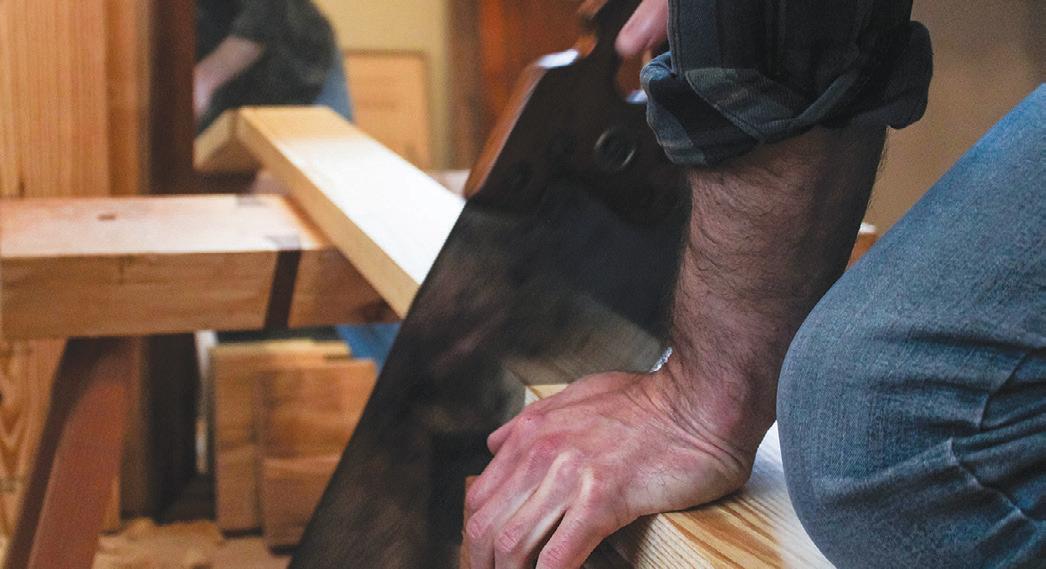
many are coerced into menial work because they lack the property, or means of production, necessary to do otherwise. According to the agrarian novelist Wendell Berry, our modern economy, in offering us certain jobs, buys our freedom as workers, “pays for it, and then persuades its money back again with shoddy goods and the promise of freedom.” This form of slavery is easily entered once “we have mechanized and automated and computerized our work...in order to have leisure and pleasure;” for such “progress” often divides us from the true goods we are meant for: community, the satisfaction and beauty of a job well done, and a closer relationship with God through a more intimate and respectful relationship with His creation.
In response to our acceptance of such a “filthy, rotten system,” as Dorothy Day called it, she and Peter Maurin founded the Catholic Worker movement in 1933, in the belief that the Church had answers to the social ills of the day—especially those pertaining to labor. I was introduced to those answers during the years I lived at the Catholic Worker, and in a class of Senior Vice President Michael Griffin’s. In the social tradition of the church is found a vision of a more humane economics called distributism: a vision of an economy rooted in the wide distribution of property and the means of production, centered on the home and family, and preferring the work of artisans and handcrafts to automated production. The main focus of distributism is not large government programs; it is personal action, especially in how one consumes, and how one works.
Hillaire Belloc, who along with G.K. Chesterton was a primary formulator of early distributist thought, argued that even the decision whether or not to buy quality furniture is bound up with our quest for freedom wrote “...a well-made piece of furniture, neither repulsive nor mechanical in design, will cost more than a piece turned out by mass production. But you are buying something for society at that price, and it is a something well worth society’s while—much better worth in our eyes than cheap furniture. That ‘something’ is citizenship, and an escape from slavery.” Over the last few years, I have acquired the property, knowledge, and skills necessary to build furniture. I have a workshop, tool chest, and supply of lumber. My shop is in the back bedroom of my home; and so far the majority of my customers have been my friends and neighbors.
Distributists have often been charged with wanting to unravel industrial “progress,” and returning to the middle ages: the age of craft guilds, an agrarian-centered economy, and the relatively wide distribution of property. But looking back to such a time may not be a bad thing—if their age was marked by the practices institutionalized and preserved in the monasteries; the very practices we’ve been made for as humans.
“Ora et Labora et Lege” (Pray, Work, and Study)
At Holy Cross, I took a course called “Creation and Evolution,” taught by
Brother Lawrence Unfried, C.S.C.
and Professor Edward Gareau. Tracing the evolution of man, I came to realize that what sets us apart from other animals are the very same human abilities central to the monastic ethos: prayer, work, and study. This is our nature; so, to live in accord with the natural law, one must recognize and develop these capacities and gifts. It is by the harmonious interplay of these three practices that my own work has happily evolved into something both scholarly and prayerful.
I rely on books about hand-tool woodworking. Besides those forms of study, the very practice of the craft demands a constant learning from mistakes, and an attitude of developing and testing arguments. Each new piece of furniture is an essay on what I have come to understand about the nature of wood, beauty, and humanity. Prayer in work is also important, giving otherwise “secular” work a uniquely Christian flavor. Prayer is a conversation that situates one’s work in the larger story. There is a goal to that story and looks like work; and that Aristotelian telos, or end, to which our virtues aim, is also our sole hope.
“Ave Crux, Spes Unica” (Hail the Cross, Our Only Hope)
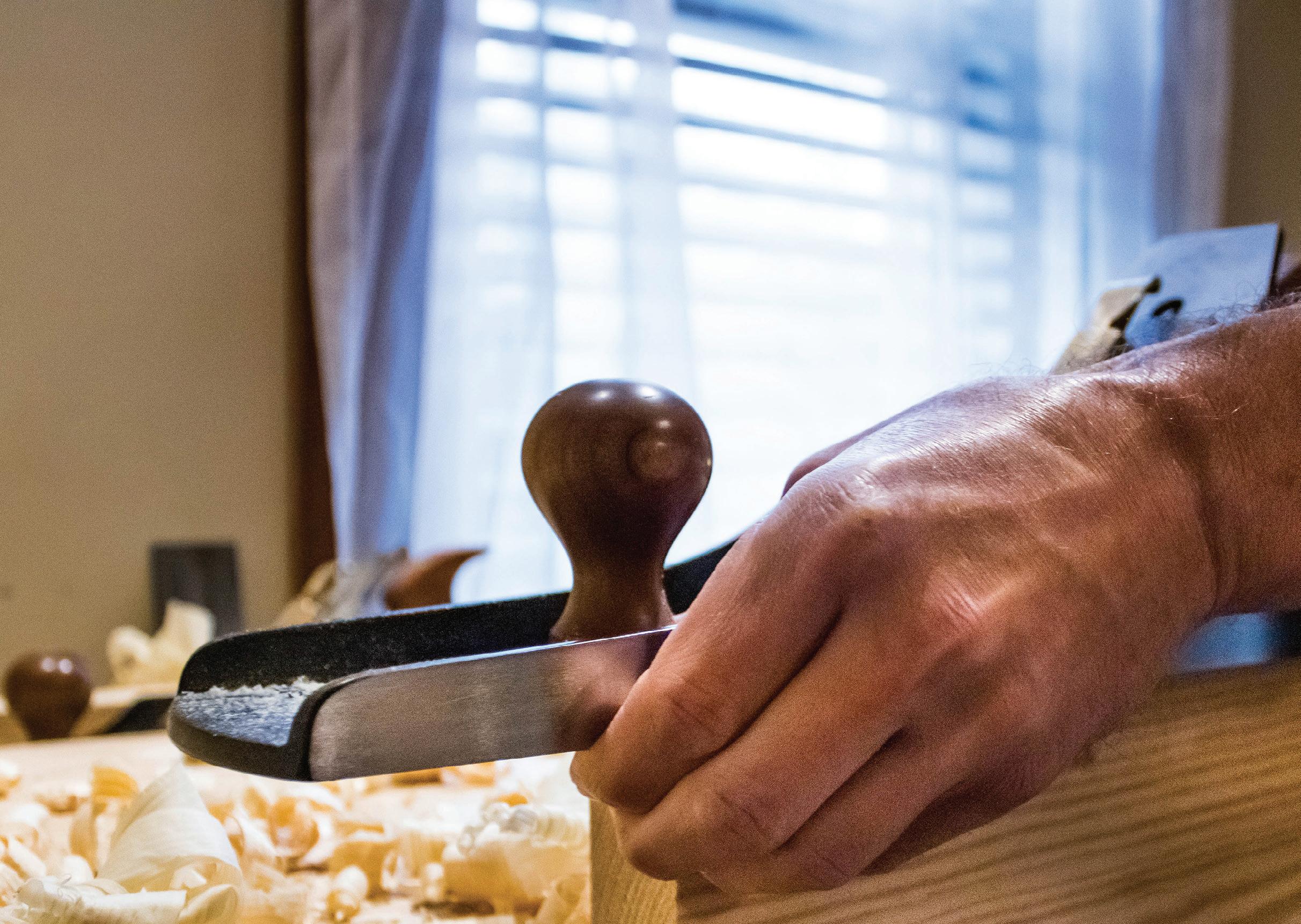
My hope is that our own good works will find their ultimate purpose. When I rest in the recently completed chair and run my fingers over the handworked details, I rejoice in the gifts of scholarship, prayer, and work that brought it to be. It is thanks in large part to my time at Holy Cross, my Alma Mater, that I have come to this good work; and it is by the grace of God that such wisdom has found its way into this seat. You can view Daniel’s work and contact him at:
www.debakerfurniture.com



